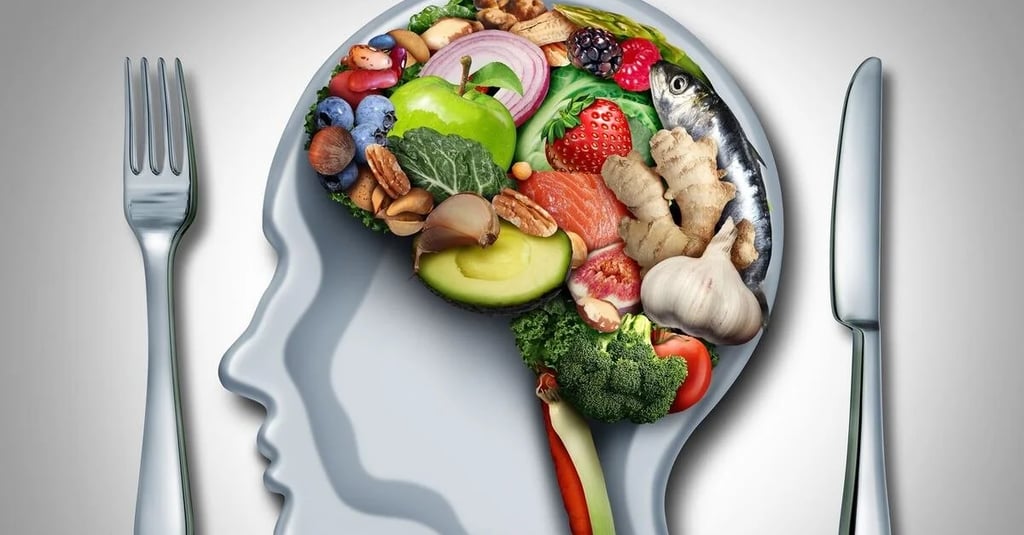Fuel Your Mind: How Changing Your Diet Can Improve Your Mental Health
Discover the powerful link between diet and mental health. Learn how changing your diet can reduce stress, anxiety, and boost your emotional well-being.
WELLNESSHEALTHBLOG-LIST
10/26/20243 min read


Have you ever wondered if what you eat could influence your mood and mental well-being? The answer is a resounding YES! Growing research demonstrates the close connection between our diet and mental health. Adopting a balanced diet rich in essential nutrients can make a real difference in managing stress, anxiety, and even depression. Ready to nourish your mind and feel better in your skin?
In short:
A balanced diet plays a crucial role in your mental health.
Certain nutrients are essential for proper brain function.
Reducing processed foods and sugar can improve your mood and energy.
Simple dietary changes can positively impact your emotional well-being.
Table of Contents
The Link Between Diet and Mental Health
Key Nutrients for a Healthy Brain
Foods to Favor for Better Mental Health
Foods to Limit for a Serene Mind
Tips for Changing Your Diet Gradually
FAQ
Conclusion
1. The Link Between Diet and Mental Health
Our brain, like all organs in our body, needs nutrients to function properly. A diet lacking in vitamins, minerals, and essential fatty acids can affect the production of neurotransmitters, the chemical messengers that regulate our emotions and mood.
Studies have shown that a diet rich in fruits, vegetables, whole grains, and lean protein is associated with a reduction in symptoms of depression and anxiety. Conversely, a diet high in processed foods, added sugars, and saturated fats can increase the risk of mental health disorders.
2. Key Nutrients for a Healthy Brain
Omega-3s: Found in fatty fish (salmon, mackerel, sardines), flax seeds, and walnuts, omega-3s are essential for brain development and function. They help reduce inflammation and improve communication between neurons.
B vitamins: Important for energy production and neurotransmitter synthesis, they are found in leafy green vegetables, legumes, and whole grains.
Vitamin D: Nicknamed the sunshine vitamin, it plays a crucial role in mood regulation and depression prevention. It is found in fatty fish, eggs, and fortified dairy products.
Magnesium: An essential mineral for muscle relaxation and stress management, found in leafy green vegetables, nuts, seeds, and dark chocolate.
Zinc: Important for cognitive function and memory, it is found in seafood, red meat, and legumes.
3. Foods to Favor for Better Mental Health
Fruits and vegetables: Rich in vitamins, minerals, and antioxidants, they protect the brain from oxidative stress and contribute to a good mood.
Whole grains: A source of stable energy and fiber, they promote satiety and blood sugar stability, which helps regulate mood.
Lean protein: Fish, poultry, eggs, legumes... they provide the amino acids necessary for the production of neurotransmitters.
Nuts and seeds: Sources of omega-3s, vitamins, and minerals, they are true allies for the brain.
Dark chocolate: Rich in antioxidants and magnesium, it can improve mood and reduce stress (consume in moderation).
4. Foods to Limit for a Serene Mind
Processed foods: High in added sugars, saturated fats, and additives, they can disrupt the balance of the gut microbiota and affect mental health.
Added sugars: They cause spikes in blood sugar followed by sudden drops, which can lead to mood swings, irritability, and fatigue.
Sugary drinks: In addition to their negative impact on physical health, they can contribute to anxiety and depression.
Alcohol: Consumed in excess, alcohol can worsen symptoms of depression and anxiety.
5. Tips for Changing Your Diet Gradually
Start gradually: Introduce new healthy foods little by little, gradually replacing less nutritious foods.
Cook more: Preparing your own meals allows you to control the quality of ingredients and avoid additives.
Stay hydrated: Drink enough water throughout the day for proper brain function.
Listen to your body: Learn to recognize hunger and satiety signals.
Be patient: Changing eating habits takes time, don't get discouraged!
FAQ
Q: Is there a miracle diet for mental health?
A: No, there is no miracle diet. A balanced, varied diet adapted to your needs is the key to good mental health.
Q: Can I still enjoy myself while eating healthy?
A: Of course! Balance is essential. Allow yourself small pleasures from time to time, without feeling guilty.
Q: When will I start to feel the benefits of a better diet on my mental health?
A: This varies from person to person. Some people may experience improvements quickly, while others will need more time.
Conclusion
Changing your diet to improve your mental health is a valuable investment in your overall well-being. By adopting a diet rich in essential nutrients and limiting processed foods, you nourish your body and mind. Remember that every small step counts, and every positive change you make to your diet can have a significant impact on your mental health and quality of life.
